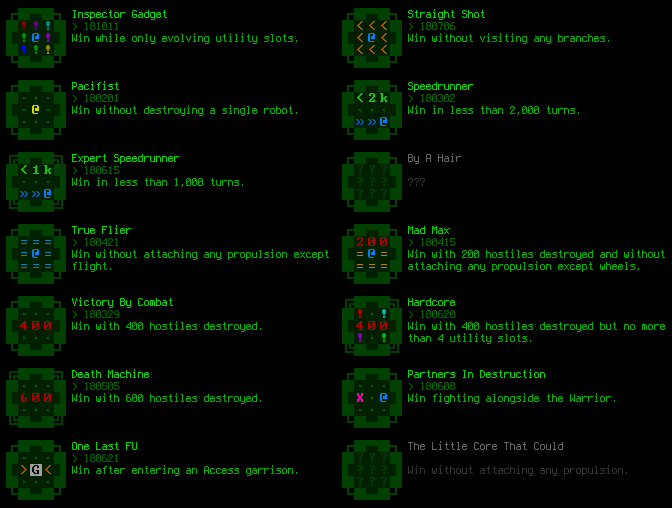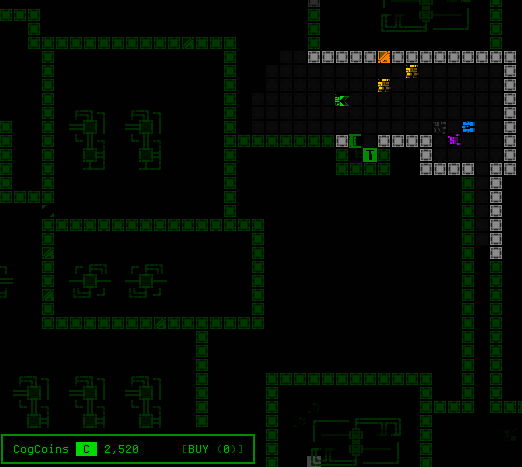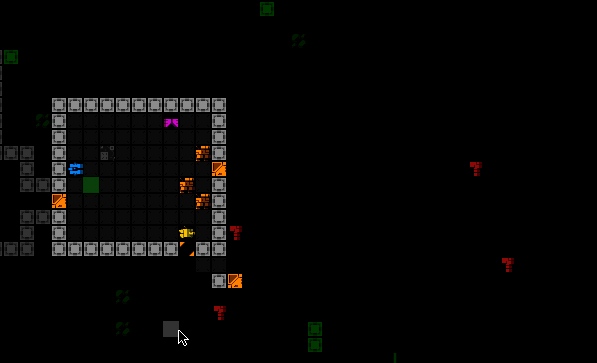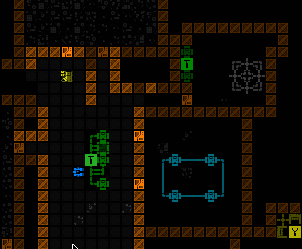Special game modes in the context of Roguelike

By their nature, games of the genre of roguelike have high replayability, but at the same time they can serve as an excellent foundation on which this replayability can be repeatedly increased. Change a few variables here, add some content there, and get a completely different game. Yes, probably, not everyone will like it, but they are not obliged to play it. But other people who like the alternative regime will get a completely new way of interacting with the familiar world, or will perceive it as a new “challenge”.
The list of what I call the “special modes” includes everything from time-limited events to “challenges” and new styles of transmission. In fact, these are other ways to play the same game. These are mainly methods that are clearly codified by the game, but in this article we will consider non-codified ones.
Why do we need special modes?
There are good reasons for adding special modes in roguelike. Here are some of the benefits that I have discovered over the years of work on them:
- Value : as is the case with any additional content, new modes increase the value of the game in the player's eyes. In addition, they add value to the community as a whole, because special regimes become another source of interaction: people share stories, brag about achievements, or simply discuss strategies.
- Replayability : special modes can force players to explore completely new strategies in the context of the knowledge that they have accumulated during the game. New modes show the game from a different angle, making the replay genre even more replayable.
- Training : looking at the game from a different angle, you can use part of the knowledge gained in the alternative mode to improve your skills in the main game.
- Experimentation : special modes allow players, and, more importantly, the developer, to experiment with new ideas that can even enter the main game - a new design in such modes can be used without serious consequences. Of course, this can be done in pre-release / beta release / early access, but the point is that for those who want to play them, these modifications can continue to live their lives without affecting the game itself.
- Interlude : the developer sometimes takes a long time to release a major update. Instead of making players wait for something new, why not release a special mode for their entertainment? (Post-release can also be included in this category - an opportunity to breathe new life into the game after the release of all or most updates and the “completion” of development)
- Efficiency : working with special modes as with “interludes” is simplified due to the fact that usually they are not so difficult to implement. With their help, you get a big “exhaust” in terms of effort, re-using not only assets , as it would with an extension or DLC, but essentially re-using almost “the whole game” and slightly (or significantly) changing the gameplay for pretty short time. This increases the value of the game at the cost of small efforts.
Naturally, it is more logical to add a special mode to an existing and developing project, because it has more content and systems with which to work. However, theoretically the same characteristics apply to any roguelike, large or small. However, such modes are just additional goals, and if your basic game is not ready yet, or at least it does not have an exciting gameplay, then obviously you should first focus on it.
')
Examples
To demonstrate the above, let's look at the special Cogmind special modes that can take various forms.
Time-limited events
Over the course of a couple of years, I have repeatedly added special modes that run automatically at a certain time. Of course, the players should have the opportunity to refuse and play in the normal passage, but I made sure that these modes are not included if the player has not tried to play several times and does not have any experience (or, in the case of one event, rather a lot of experience).
Many indie developers today create themed events dedicated to the holidays, but usually they are not very extensive and are associated mainly with a small substitution of content.
A good option is the first of April, because the topic can be a combination of something completely insane, funny and unexpected. In addition, he has a consequence - people just do not believe the news, but when someone finds out that the news is real, then it conflicts with the disappointment of often-fake ads. I like to announce the first of April about the functions that actually appeared.
While I was conducting a couple of such events, starting in 2018 with Launcher Mode . This is a good example of how simple modifications can change the whole game process in an interesting way. In fact, this mode simply converts all collected weapons into a random rocket launcher. Installations are powerful, but they spend a lot of resources and do not cope with all the difficulties, so the strategic avoidance of their shortcomings is a fairly new experience for players. In addition, players are taught to use interesting types of weapons that are less common in a regular game.

An example of a part of the map where all the items on April 1, 2018 were replaced with random rocket launchers.
The changes were made so quickly that a couple of flaws remained in this mode, for example, one of the first enemies still can drop their weapons, and thanks to this you can not arm yourself with a rocket launcher, but soon after the release I fixed the main problems with the patch.
From the creation of the concept to the implementation and release for the development of this mode, it took me only an hour , and at first I didn’t even plan it, but literally on the morning of April 1, the player asked me about April Fool's Day, and this gave me an idea (here’s another reason to create active community - communication creates new ideas). At the cost of a small effort, I got a serious advantage.
Unfortunately, I do not know how many people actually played in this mode, because I decided to turn off the loading of indicators on the server so as not to clutter up the leaderboard with non-standard walkthroughs, but they started publishing news about this mode everywhere (and they even caught the attention of new buyers), and it seemed interesting and funny to people, even if they didn’t play it.
Of course, the data on AFD (April Fools Day) could have been sent somewhere, but then I didn’t think about it, and besides, I didn’t have time to think it through - I released the release on the same day!
However, in April 2019, I again released a special treatment. This time I had both experience and a little time to prepare the redirection of the results of the passage of this mode, so I managed to get user data and a separate table of records. There were few participants (42 players), because in the record tables the results are selected by choice, and besides, the mode is limited in time, but it was still interesting to look at the passing statistics .

Cogmind Records Table on April Fool's Day
The topic of AFD 2019 was Pay2Buy (“Pay and Take”) - players do not find and do not collect spare parts, but save money and buy items in Cogshop. There was even a market economy, lutboksy and even discounts!

Buying items in Cogshop.
This, of course, did not take an hour of work, as in the case of AFD 2018.
It took me a week to design and build Cogshop and its related mechanics, and I spent it with benefit. In accordance with the principle of “interlude” described above, this gave me the opportunity to lay out something new in the absence of regular releases. The last release was released 7 weeks before the first of April, and now, 7 weeks later, the next release also hasn't come out yet (I'm still working on extremely time-consuming features), so yes, I really needed something in between.
In fact, Pay2Buy was not the first idea this year - until April 1, I experimented with turning Cogmind into a real-time game, but it seemed to me that for most players it would not be interesting, so I abandoned this idea. I tell about this mode and its design on Patreon (link only for sponsors).
Another important aspect of these “time-limited” events is that I designed them so that they are also available after the date of the event. Not everyone who would like to play it, had the opportunity to do it on April Fool's Day, so just as players can refuse events, they can choose them on any other day (both parameters are controlled by a switch on the command line). In the case of the event of 2018, it was different - then I simply advised to “change the date in the system and launch a new walkthrough”, but it would be inconsiderate for the players to do this. This year I added a function to switch modes.
So, these modes of events have become permanent parts of the game. They are fairly simple and isolated, so they should not require additional maintenance in future versions, so I can probably provide access to them for all future buyers.
Later last year we had another time limited event, the creation of which I approached completely differently: Limited Edition Holiday Mode 2018 .

Logo Cogmind Limited Edition Holiday Mode 2018
This event took place from December 20 to January 1, and its feature was the receipt of gifts.

There are a lot of presents on the dump! Who could arrange such a thing? ..

Go open them!
At the opening of each of the gifts, one or more items appeared, and very good ones, available directly in the initial area. But not any good items, the main part was chosen among 17 completely new thematic holiday items, some of which have a new mechanic (for details, see this ad on the forum ).

We throw a piece of "Coal" next to the garrison and flee.
Some of the less specific items were randomized, but most of them I chose manually for each to ensure different gameplay through various combinations. Of course, this took into account special days: Christmas Eve, Christmas and New Year. The wildest and brightest thing I've saved for the new year:

Behold the RPDS!

RPDS Demonstration: Now More Tiles Version
Yes, it looks cool, but this weapon eats up resources, so using it is not so easy! Not to mention the fact that the complex starts to go crazy when you destroy such a part of it with a stroke, and this usually leads to problems. But still funny.
It seems that I had to work quite a lot, although in fact I spent only two days ! Honestly, it surprised me. I would have to spend more time if I decided to provide compatibility with future versions of the functions of this event, but it was a really time-limited event available only in one version of Cogmind. Therefore, I was able to quickly add content without investing much effort in preparing for the possible long-term consequences of my decisions (and also not bothered with well-organized scripts and code), as I usually need to do.
This reveals one of the disadvantages of the special modes: in order for them to work in the next versions, you may have to support them with all the changes in the rest of the game, which takes time and sometimes is not worth it. Therefore, it is necessary to separate temporary, but large-scale regimes and regimes with a more limited set of functions, which in the future will be easier to maintain with minimal effort.
Both AFD 2018 and Holiday Mode had a very big exhaust. This is less related to AFD 2019, but it was still worth it, because it remained in the game and became a rather interesting variant of the gameplay.
Challenge Modes
Cogmind currently has 12 Challenge modes. The space for design in their case is a little narrower than that of time-limited events, which themselves could be complicated, but the main emphasis was on interestingness. Challenge modes are an optional way for a player to increase the level of difficulty of the game with the help of various modifications. At the same time, you can activate several challenges, and each of them periodically rewards points for achieving goals. In addition, the Challenge allows you to push the player with other or unusual difficulties compared to the standard walkthroughs.
Previously, I did not talk about them in a blog, because I generally considered them as an “experimental” part of the game, even though I led a topic on the forum with updates to their content.
In fact, they cannot even be included through the in-game menus, only through the external configuration file, but the “Challenges” modes were properly integrated into the game with the help of achievements obtained upon victory , and a separate table of records is maintained for them.
Below is the current list of possible modes. These are just modes that I thought were difficult or that were easy to implement and were worth experimenting with them:
- Devolution : the player starts with a triple number of slots for spare parts, selected at random (from a weighted distribution), and loses a random number with each new evolution, gradually turning from super strong to extremely weak.
- Fragile Parts : all parts are destroyed when removed, imitating the standard behavior of processors.
- Gauntlet : all exits from the card are blocked, with the exception of the farthest from the entrance.
- Inhibited Evolution : at each depth, the player evolves to halved the number of slots (in fact, when passing it turns out to be weaker).
- No Salvage : destroyed robots do not leave trophy parts, only matter (resource), which complicates the search for the necessary / useful parts.
- Pure Core : throughout the passage there are no inventory slots, there are only attached and character details.
- Scavenger : in the main complex there are no warehouses of random spare parts, and all single scattered items are damaged. Everything else needs to be collected from other robots, stolen from transport workers or manufactured.
- Simple Hacker : no indirect or manual hacking.
- Sticky Parts : no parts can be removed or replaced manually, and slots must be destroyed to free them.
- Super Gauntlet : All exits from the maps are blocked, the only way to move to the next depth is to find one unlocked garrison and fight with it.
- Trapped : Most cards have 10 times more traps with a higher probability of triggering, and most ways to learn the knowledge of traps are not available.
- Unstable Evolution : there is no control over the evolution of slot types, which occurs randomly.

Random damaged parts scattered around the map in the Scavenger Challenge mode.

In the Simple Hacker mode, the manual hacking option is disabled.
(Images from other challenging modes, as well as new ideas and discussions can be viewed on the forum. In addition, the game manual has a more detailed description of the mechanic and points.)
Most of the above was actually quite easy to implement, and this is another way to increase the value of the game and add a new experience at the cost of small expenses.
Challenge modes are still part of the development. I added the latter a long time ago, but I still have dozens of ideas in this area (and many more were offered by the players themselves). I just need to decide when to add new modes. I planned to create an in-game menu to access them, releasing it and other functions in a separate release, but this is a time-consuming, but low-priority function, so I constantly postpone it.
Conducts
Conducts (also called "challenge games" or "challenge games") exist in many roguelikes since classic games. Conducts differ from Cogmind's so-called “Challenge modes” in that the latter change content or mechanics to create a challenge, and traditional conducts work inside the base game without any changes — they are entirely dependent on a player’s restriction.
For example, NetHack has many optional conducts that you can read about in the wiki game .

Some of the conducts of the NetHack game are listed using the #conduct command.
Brogue also has conducts called “feats”. Their full list is listed here .

Brogue's victory screen, the player performed two conducts.
Unlike these examples, which are simply automatically recognized by normal passing, in Angband, players essentially use some of the birth options as conducts, although there are not very many of them - some roguelikes are more likely to create conducts than others.
Not all conducts are necessarily tracked by the game, many appear in the community of players and become “unofficial” conducts, challenges, chosen by many players, but not technically coded in the game. Players independently impose certain restrictions or requirements.
NetHack also has a decent list of unofficial conducts (some of them are tracked by variations of the game, but not the “vanilla” version), and ADOM also has many well-established unofficial conducts . Some of the achievements of ADOM gradually became "semi-official" - in the Steam-version of the game for them are given "achivki".
Cogmind definitely has its share of experienced players who apply conducts on themselves, and even their “official” set, represented by relevant achievements. However, Cogmind achievements do not require Steam, codify the conducts and force them to adhere to only the achievement system, and therefore, technically, each of them only works once (when first received). Later, I can extend this feature so that they are recognized in any subsequent walkthrough, even after receiving an achievement, but I’m not sure about the value of it, because I have many other more important functions. In addition, there are a lot of achievements, so players will still have something to do, doing new and different things, rather than repeatedly achieving the same goal.
It is also worth noting here that the traditional conducts are more specific than many achievements that can be obtained even before winning the game. Conduct is not completely completed until the passage is completed, so they are usually difficult and chosen by a minority of experienced winners in order to intentionally make roguelike even harder.
Currently, Cogmind has 256 achievements, but all conduct-achievements related to the victory can be attributed to the following subcategory:

Examples of Cogmind achievements in UI.
There are also 12 achievements for winning in each of the challenge mode, but, again, they change the mechanics of the game, so I will not consider their conducts. And quite a few Cogmind achievements require long-term conducts during a single pass, but can theoretically be obtained before victory, therefore they are not considered either.
Non-Conducts related
The roguelike Conducts described above and common in the community are “meta-achievements” - optional add-ons added on top of the game itself. Often they can be stopped at any time at the player’s choice, regardless of whether the game is tracking this conduct.
But I think that there is an interesting alternative category of conducts that is built into the gameplay.
A curious example of this is the god conducts from Dungeon Crawl Stone Soup (DCSS). When you worship a particular god, he may expect you to avoid certain actions, or to reward piety for doing other things. Obviously, this limits the player's behavior, or at least affects him for most of the passage, unless the player decides to survive the consequences of going under the protection of another god.
The list of DCSS gods can be viewed here , there are links to more detailed information about each, and under the heading Deprecates the types of conduct that God expects from the player are listed.

A good example of a strict god is Chei from DCSS.
Most gods don't have many limitations. They are more important actions that they expect from the player to give him piety and reward. An interesting example here is Ru , the god who (largely) rewards the player for choosing additional and permanent flaws (“personal sacrifices”) that essentially act as smaller-scale conducts.
Cogmind also has some of these “built-in conducts” that are not related to meta, but they do not belong to gods, but have a macro level. For example, you can install RIF forever to get many useful abilities, but if you do that, you will be hated by the other two factions, and you will lose the ability to use their help and abilities until the end of the passage.
There are many such long-term effects, but unlike traditional conducts
of roguelike, which always act negatively, Cogmind usually (but not always) balances them with what the player acquires in the process of passing something else, of similar value. Be that as it may, the effects are long lasting, and some of them make certain areas or the whole passage more difficult.
Randomized Challenges
Besides traditions, there are many opportunities for innovation in the roguelike “special modes” space.
One of the most interesting is randomization of challenges. The roguelike genre is based on walkthroughs and has high replayability, therefore it is well compatible with this approach - you have a set of mini-challenges (changes in mechanics, objects, behavior of enemies or the player’s character), and at the beginning of the passage a combination of such changes is assembled into one challenge. Even without selectable changes, various combinations can create a very different gameplay, and very little work is required to support all of this.
It would be even better to create such a combination for the whole community in the form of daily / weekly Challenges, which gives users more topics for discussion, and also allows you to keep separate record tables.
I'm not sure whether this solution is suitable for Cogmind, given the large number of interconnected systems and the long-term impact of balance (compared to many roguelike, this is a very carefully balanced game), but the concept is definitely worth thinking through and even experimenting. This may be interesting!
Although combining multiple modes of challenges is a good idea, personally, I have quite definite thoughts on what this mode should consist of: a pool of combined mini-challenges should exclude changes that make too little (or too much) of a new one. I think that important game variables need to be changed, such as the availability of items, dropping out trophies and the population of maps, add various permanent positive / negative effects or even the ability to start in other parts of the world.
Anyway, I still have a lot to do, but maybe someday I will implement it.
Source: https://habr.com/ru/post/459488/
All Articles